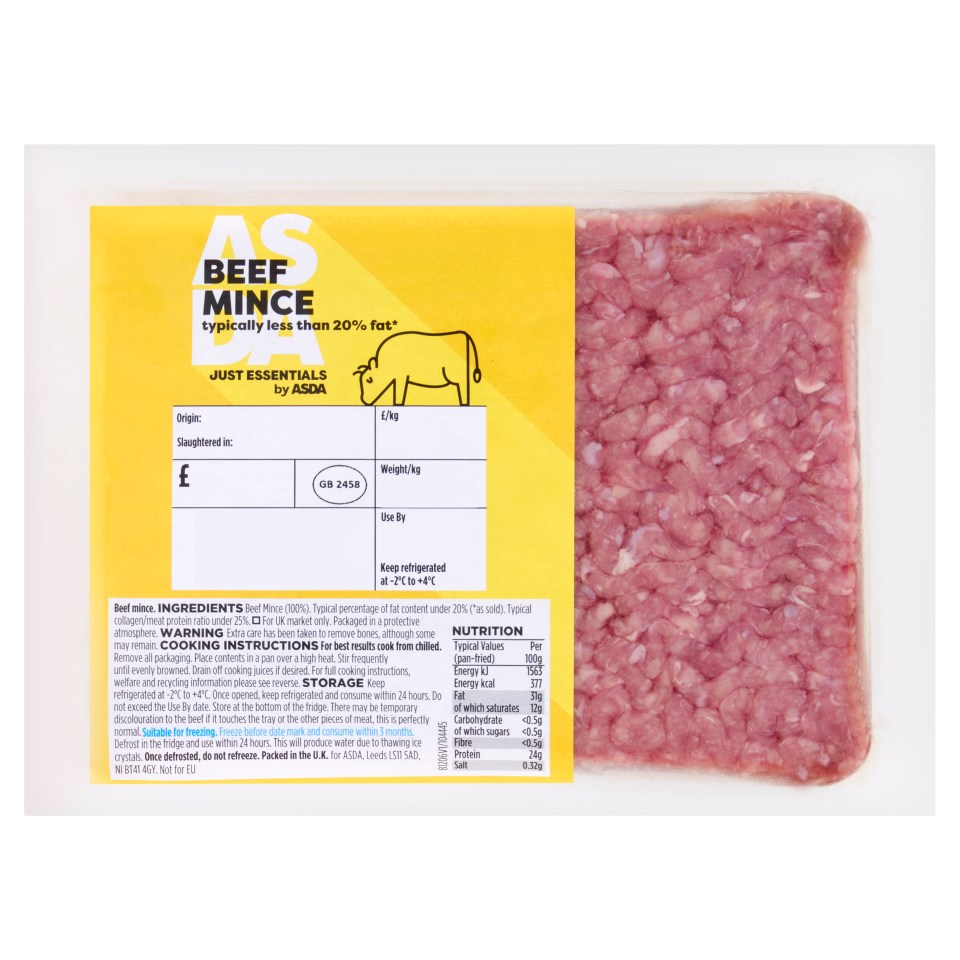ASDA has made a major change to its meat products across all its stores in a move that could leave shoppers fuming.
The supermarket giant made the seismic move to the popular food items just months after Iceland received backlash for the same alteration.
Asda introduced vacuum packaging on its fresh beef mince in stores at the end of March.
By swapping away from the traditional plastic boxes, the retailer says it will use 60 per cent less plastic.
It added that the move would also reduce its carbon emissions as fewer trucks would be needed on the road.
The change has affected all types of fresh mince sold in stores, including its full fat beef, reduced fat 12 per cent beef, and low-fat five percent beef.
One shopper spotted the new packaging at a store in Leeds, with a large sticker advocating “60 per cent less packaging”.
The supermarket has said the vacuum sealed pouches would “double” the shelf-life of the products, helping to both reduce food waste and therefore potentially help save customers money.
It also confirmed that the Excellence range at the retailer would remain in its current packaging, while the remainder of its beef and lamb mince products moved to the vacuum sealed type.
An Asda spokesperson said: “We’re focused on delivering great value for our customers, without compromising on the quality of our products.
“By using vacuum sealed pouches across more of our beef and lamb mince products, we’re doubling the shelf-life of these products, which reduces food waste and helps customers save money in the process.
“This change will also see 60% less packaging used, reducing the number of trucks on the road and lowering carbon emissions.”
It comes just months after frozen food giant Iceland received major backlash to its decision to also introduce vacuum sealed packaging.
Shoppers were left fuming after discovering their favourite mince meat products had been repackaged into the new design.
Following the enormous uproar, the supermarket decided to re-instate its traditional plastic trays.
It was designed to contain 50% less plastic and sought to reduce the retailer’s annual consumption by 35 tonnes.
At the same time, it was said to keep the products fresh for approximately two and a half weeks – increasing product shelf life by almost 50% – and allow more packs to fit into one delivery truck, thus cutting down on carbon emissions and ensuring a consistent supply.
Iceland shared the news of its u-turn on X, declaring that “you asked, we delivered. The classic mince packaging is back!”
How to cut the cost of your grocery shop
SAVING on your shop can make a big difference to your wallet. Here are some tips from comparison site Money.co.uk about how you can cut the cost of your shopping bills:
- Write yourself a list – Only buy items that you need. If it isn’t on your list, don’t put it in the trolley
- Create a budget – Work out a weekly budget for your food shopping
- Never shop hungry – you are far more likely to buy more food if your tummy is rumbling
- Don’t buy pre-chopped veggies or fruit – The extra they’ll charge for chopping can be eye watering
- Use social media – follow your favourite retailers to find out about the latest deals
- Be disloyal – You may want to go to different stores to find the best bargains
- Check the small print – It’s always worth checking the price per kg/lb/litre when comparing offers so you’re making a like for like decision as a bigger box won’t necessarily mean you get more
- Use your loyalty cards – Don’t be afraid to sign up to them all. They all work slightly differently – work out what bonus suits you better and remember to trade in your points for additional rewards
One user praised the move, commenting that vacuum packaging “made the meat mush” and caused it to look “unappealing”.
“Will definitely be getting our mince meat from [Iceland] from now on, since you’re the only retailer that seems to listen to customers,” they said.
Others agreed that the redesigned packaging “made the product look unappealing and horrible”, and that the return to plastic trays is a “good move”.
Other supermarkets have also ventured their way into the vacuum sealed packaging world.
Lidl’s transition into vacuum-packed beef mince was intended to lower its plastic consumption by 63% and save 250 tonnes every year.









